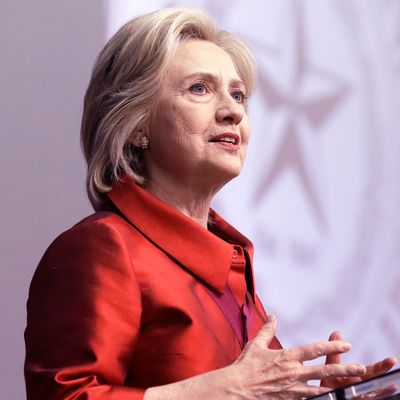
Yesterday, Hillary Clinton endorsed automatic voter registration for all 18-year-olds. Expanding access to voting rights is a civil-rights issue that can be justified entirely in good-government terms. At the same time, it is also a completely partisan issue. The Republican Party is in favor of making voting more inconvenient in the correct belief that winnowing the electorate operates to its partisan advantage.
The Republican Party prefers to frame its stance on voting rights as a deep concern for preventing voter fraud. The most common response to this is to point out that voter impersonation is vanishingly rare — since 2000, 31 instances of it have been found, out of a billion ballots cast. But the true nature of its concern reveals itself most clearly when the party’s mania for suppression can be detached from its professed concern for preventing voter fraud and examined in naked isolation.
In theory, there are a number of ways one might make voting more convenient without enabling fraud. One of them is to expand early voting. A bipartisan commission, co-chaired by Democratic campaign lawyer Robert Bauer and Republican campaign lawyer Ben Ginsburg studied voting extensively and issued a 2014 report that, among other recommendations, endorsed more early voting. The authors, who engaged in months of public hearings and consultations with officials, found that voters are willing to tolerate waits to vote if they can pick a convenient day. “What does emerge from evidence about the experience of voters is that their tolerance for wait times is considerably higher with early voting,” the report found, “Having chosen the day and time for voting that is convenient for them, early voters are described as being in a more ‘celebratory’ frame of mind than under the often rushed circumstances they face on Election Day when they must vote at a specific location on a specific day.” This makes perfect sense — if you can pick a day when you’re not too busy, you can stand a longer wait than having to queue up on a day you don’t pick when you might not have time to spare.
The official Republican response rejected the endorsement of early voting. Letting people vote early, the Republicans reply, “diminishes the importance of Election Day.” While the bipartisan commission found that Americans enjoy the freedom to pick a convenient time to vote, the Republican Party declared that this is not the case — “Most Americans continue to prefer to vote alongside their neighbors and fellow citizens at the polls on Election Day so reform needs to start there.” This is a bit like saying most Americans prefer vanilla, therefore chocolate should not be allowed. If people prefer to vote on Election Day, they can.
Now, perhaps the Republicans are simply moved by a sentimental attachment to Election Day, and they don’t want it to get less special-feeling by giving people the choice to exercise their rights at a more convenient time. In that case, there is also a solution that meets the party’s concern: make Election Day a national holiday. Clinton has endorsed that idea, too, and it’s a long-standing liberal standby. But Republicans also oppose making Election Day a national holiday. As the conservative pundit John Fund has explained, making elections a national holiday might lead to people skipping work the preceding Monday. Also, Fund argued, “There’s no doubt that many people in our increasingly mobile and hectic society want voting to be as easy and convenient as buying fast food. But too much of anything can be bad — just ask someone who has gorged on drive-thru burgers and fries.” So since convenient fast food can be bad for you, convenient voting must be bad, too.
Automatic voter registration, which anybody could choose to opt out of, is another idea that would reduce bureaucratic impediments to voting without enabling fraud. It will be fascinating to watch the party generate arguments against this. The current official party response amounts to simple ad hominum criticism of Clinton (Republican spokesman: “Her exploitation of this issue only underscores why voters find her dishonest and untrustworthy,” etc.).
In the meantime, conservatives bothering to express their knee-jerk hostility have fallen back on their actual conviction, which is that voting should be restricted to a better class of people. An additional registration requirement, writes National Review’s Daniel Foster, “improves democratic hygiene because the people who can’t be bothered to register (as opposed to those who refuse to vote as a means of protest) are, except in unusual cases, civic idiots.” People who don’t have the flexibility to take extra time away from work to jump through whatever bureaucratic hurdles the Republicans throw in their path, or the familiarity with local agencies to navigate them smoothly, are too shiftless and ignorant to be trusted with the franchise.
And so Clinton’s embrace of voting rights may not have any plausible near-term prospects for enactment. But it serves to demonstrate to the party’s core constituents something elemental, and true: At the current moment, there is only one party that respects their rights as citizens.






























